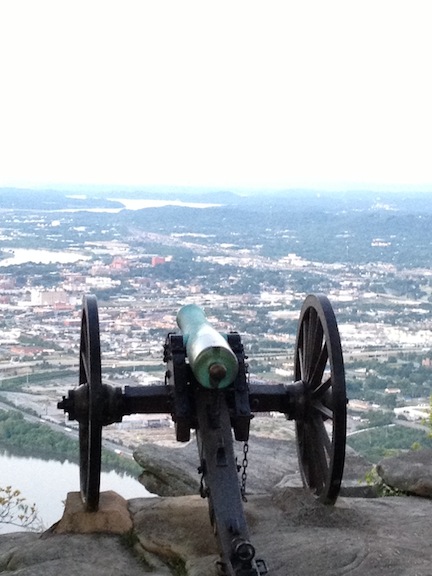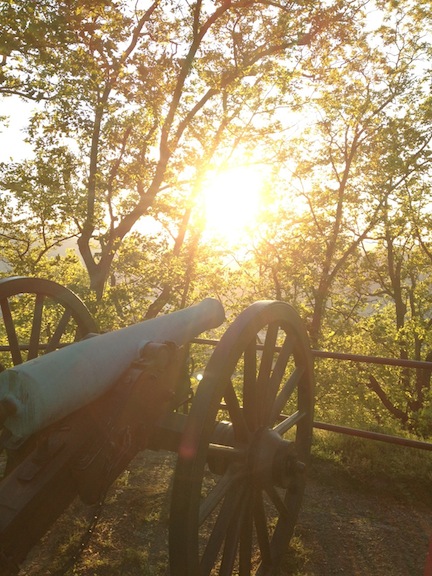Lookout Mountain
Today marks the 150th anniversary of the Battle of Lookout Mountain—”The Battle Above the Clouds,” as it later became known because the morning fog and the smoke of battle that hung cloud-like midway up the mountain while the mountaintop loomed above.
“The battle of Lookout Mountain is one of the romances of the war,” Union commander Ulysses S. Grant later wrote. “There was no such battle and no action even worthy to be called the battle on Lookout Mountain. It is all poetry.”
The battle, called a “magnificent skirmish” rather than an actual battle by one reporter, was the first in a series of engagements launched by Grant to drive Confederates away from the besieged Union forces trapped in Chattanooga.
Maj. Gen. Joe Hooker, anxious to redeem his still-bruised reputation following his May drubbing at Chancellorsville, stormed up the mountain with three divisions, overwhelming the 8,700 Confederate defenders who had the advantage of topography but who, as it turned out, could not bring their formidable artillery into play: artillerists had to depress the barrels too much, so shells would literally roll right out of them.
Hooker spent the rest of his life crowing about the victory even as Grant–partial to his Western commanders, not the bloviating Eastern transplant Hooker–downplayed it.
 From the peak of Lookout Mountain looking toward Chattanooga below, tucked in a bend of the Tennessee River.
From the peak of Lookout Mountain looking toward Chattanooga below, tucked in a bend of the Tennessee River.
 From the peak of Lookout Mountain looking toward the west. Beyond the trees, tabletop ridges stretch into the Tennessee interior.
From the peak of Lookout Mountain looking toward the west. Beyond the trees, tabletop ridges stretch into the Tennessee interior.
 A New York monument sits atop the crest of Lookout Mountain.
A New York monument sits atop the crest of Lookout Mountain.
Even though we are only 5 days into January, 2014, I am hereby nominating “bloviate” as ECW Word of the Year!
\When you want to denigrate a corps sized force defeating 8700 Rebels it, I think, is more bloviating than calling it a battle. Yes, General Hooker had an agenda, but then so too did Grant. Throughout the rest of the war, except for Sherman, Grant made a point of undermining other Union general’s successes. Even in the last Cabinet meeting on April 14, 1865, Grant’s jealousy of other’s reputation was noticeable. It was one of his more unpleasant personality traits.
Great point, Mr. Coleman. I’m just finishing up Frank Varney’s “General Grant and the Rewriting of History,” which goes in depth into Grant’s jealousies (in particular of his jealousy of Rosecrans). Not flattering at all. Indeed, if one knows where to read between the lines in Grant’s memoirs, one can see his jealousies in play all over the place.
Beginning with Fort Donelson, i challenge you to find Grant supporting any of his Generals besides Sherman.
There’s plenty of evidence–at the time and after the fact–that he supported Phil Sheridan, James Wilson, James McPherson, and even George Meade. Rather than cite documentary evidence, though, I’ll just point out the promotions he gave them and the rationale he offered at the time of each promotion.
He also liked Hancock a lot at the time. Only after the war, when Hancock ran against Grant’s political ally Garfield, did Grant turn on Hancock.